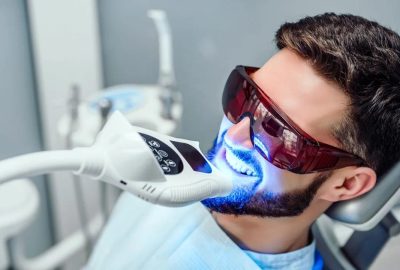Have questions about dentistry? The following FAQs can help you better understand various areas of dental care. If you have additional questions, please let us know!
How Frequently Should I Visit the Dentist?
In general, it is best to visit your dentist two times per year. The American Dental Association (ADA) advises patients to visit the dentist’s office once every six months. However, dental health needs differ according to each patient. Some patients will require more frequent treatment than others. If you have a special condition, you should meet with your dentist at a higher frequency. When in doubt, ask your dentist about the visit frequency for your unique needs.
Does It Make Sense To Use Marijuana Prior To An Appointment?
No. If you are anxious about your dental appointment, communicate your worries to your dentist. The dentist can use nitrous oxide or IV sedation to keep you calm and pain-free. If you were to smoke marijuana prior to your appointment, you would end up with a dry mouth that would heighten the chances of cavity formation, teeth staining, and gum disease.
When Do Baby Teeth Fall Out?
Kids typically start losing their baby teeth between 6-8 years of age. These teeth usually fall out in the order that they erupted.
When Should I Replace My Toothbrush?
The American Dental Association reports it is ideal to replace a toothbrush at least once every three months. As soon as you notice the toothbrush bristles are frayed, it is time to replace it.
What Is the Purpose Of Dental X-Rays And Do They Pose Any Risks?
Dental x-rays are used to highlight indications of dental disease as well as a litany of other dental issues that the dentist cannot see without the assistance of technology. Thankfully, dental x-rays do not pose any risks. The sole health risk is minimal in the form of exposure to radiation. However, dental x-ray radiation is so low that it will not cause harm. Furthermore, new technology decreases such exposure that much more. We are proud to use digital x-rays along with high-speed film that minimizes the use of radiation. Furthermore, our team goes to the extent of applying an apron with lead lining to safeguard the stomach and chest along with a neck collar to ensure the thyroid is not compromised.
What Causes Tooth Sensitivity?
Tooth sensitivity is much more common than most patients assume. In fact, the Academy of General Dentistry reports upwards of 40 million adults in the country suffer from tooth sensitivity. Those with tooth sensitivity endure pain when eating or drinking items that are cold, hot, acidic, or sweet. This is the result of worn tooth enamel that exposes the dentin. For some patients, sensitivity results from the build-up of plaque. In other cases, fractured or chipped teeth, excessive teeth clenching/grinding, gum recession, and/or the consumption of acidic food are the culprit.
It is also possible that dental procedures are the cause of sensitivity. In particular, professional cleanings, crown replacement, and root planing have the potential to lead to sensitivity. Thankfully, such sensitivity typically dissipates across the next month. If you have tooth sensitivity, reach out to our dental practice today so we can help you find the best possible treatment.
How Can I Overcome Anxiety About Dental Visits?
Upwards of 40 million Americans bypass the dentist due to anxiety and fear. If you hesitate to visit the dentist due to uncertainty, share your feelings with the dentist and the practice’s team members. Detail your concerns and the dentist will modify the treatment with your specific worries in mind. It will also help to be mindful of your breathing. Breathe deeply, slowly, and regularly. Resist the temptation to hold your breath as doing so lowers your oxygen level and leads to panic. Some patients benefit from listening to soothing music while treatment/procedures are performed.
Do not consume caffeine or sugar before your dental appointment as it will make you that much more nervous. Instead, consume high-protein foods to help you remain calm. It will also help to visit the dentist during a time of the day when there is minimal stress such as a weekend or early in the morning. If necessary, establish a hand signaling system with the dentist so you can communicate your feelings and worries by hand during the procedure. The dentist can provide you with dental sedation, such as nitrous oxide, to keep you calm throughout your dental procedure.
Do not consume caffeine or sugar before your dental appointment as it will make you that much more nervous. Instead, consume high-protein foods to help you remain calm. It will also help to visit the dentist during a time of the day when there is minimal stress such as a weekend or early in the morning. If necessary, establish a hand signaling system with the dentist so you can communicate your feelings and worries by hand during the procedure. The dentist can provide you with dental sedation, such as nitrous oxide, to keep you calm throughout your dental procedure.
What Are the Primary Risk Factors and Indicators of Oral Cancer?
Oral cancer typically develops along the mouth’s floor or along the tongue. Gum tissue cancer is not as prevalent. Oral cancer symptoms include but are not limited to:
- Jaw/Neck Stiffness
- Jaw Swelling
- Sores Or Red/White Areas That Fail To Heal
- Alterations In The Voice
- Inexplicable Teeth Loosening Or Dentures That Fail To Fit As They Once Did
- Thickening Or Lumps In The Gums, Neck, Lips, Or Other Parts Of The Mouth
Oral cancer risk factors include:
- History Of Mouth, Neck, Or Head Cancer
- The Use Of Alcohol And/Or Tobacco Greatly Heightens The Risk
- Inadequate Nutrition With A Diet Lacking Vegetables And Fruits
- Exposure To Ultraviolet Light From Either Tanning Beds Or The Sun
- Human Papilloma Virus Also Known As HPV
- Gastro-esophageal Reflux Disease Or GERD For Short
The timely detection of oral cancer is imperative for treatment to prove successful. It is important to see your dentist regularly for a thorough oral cancer screening.





